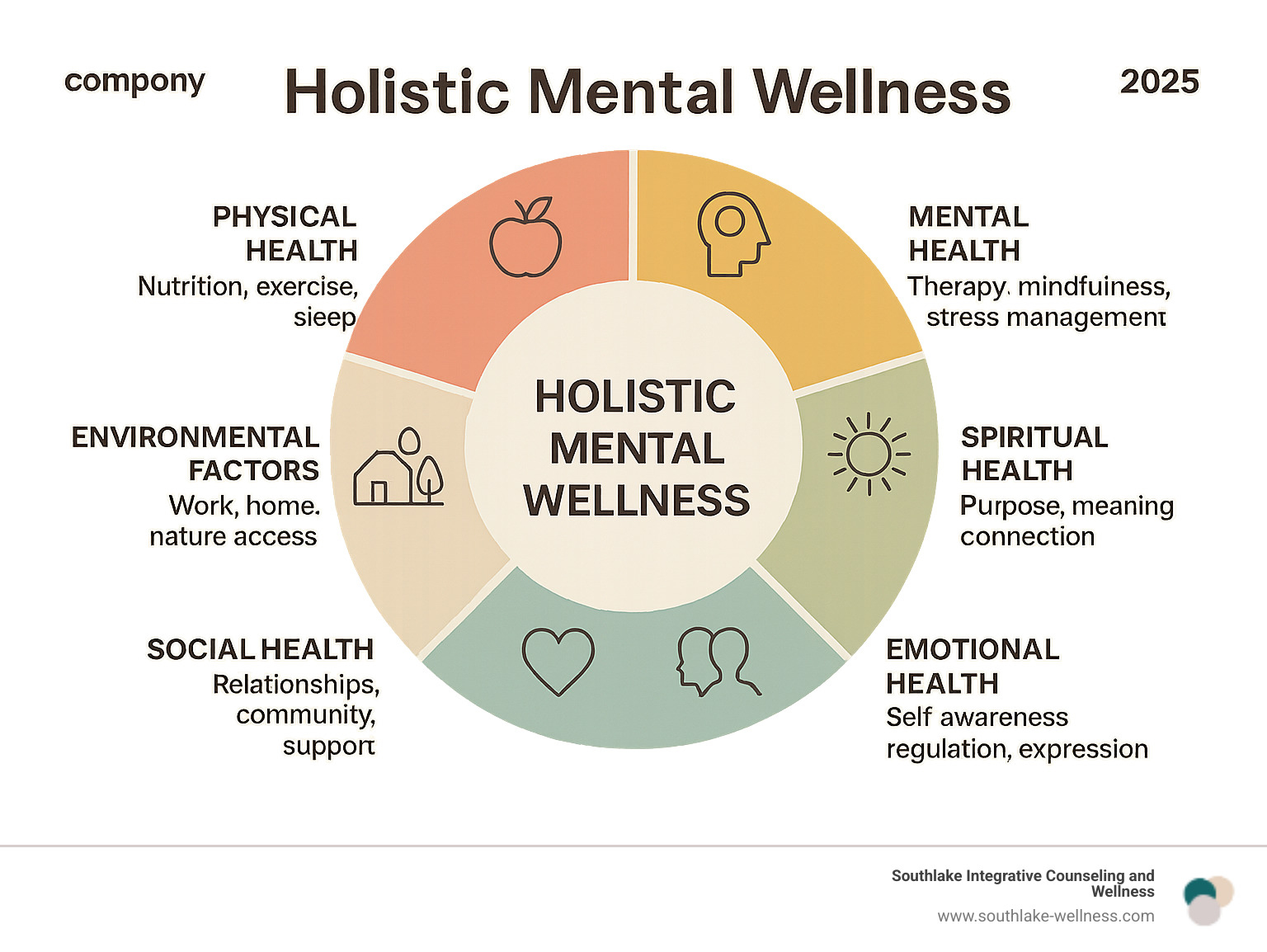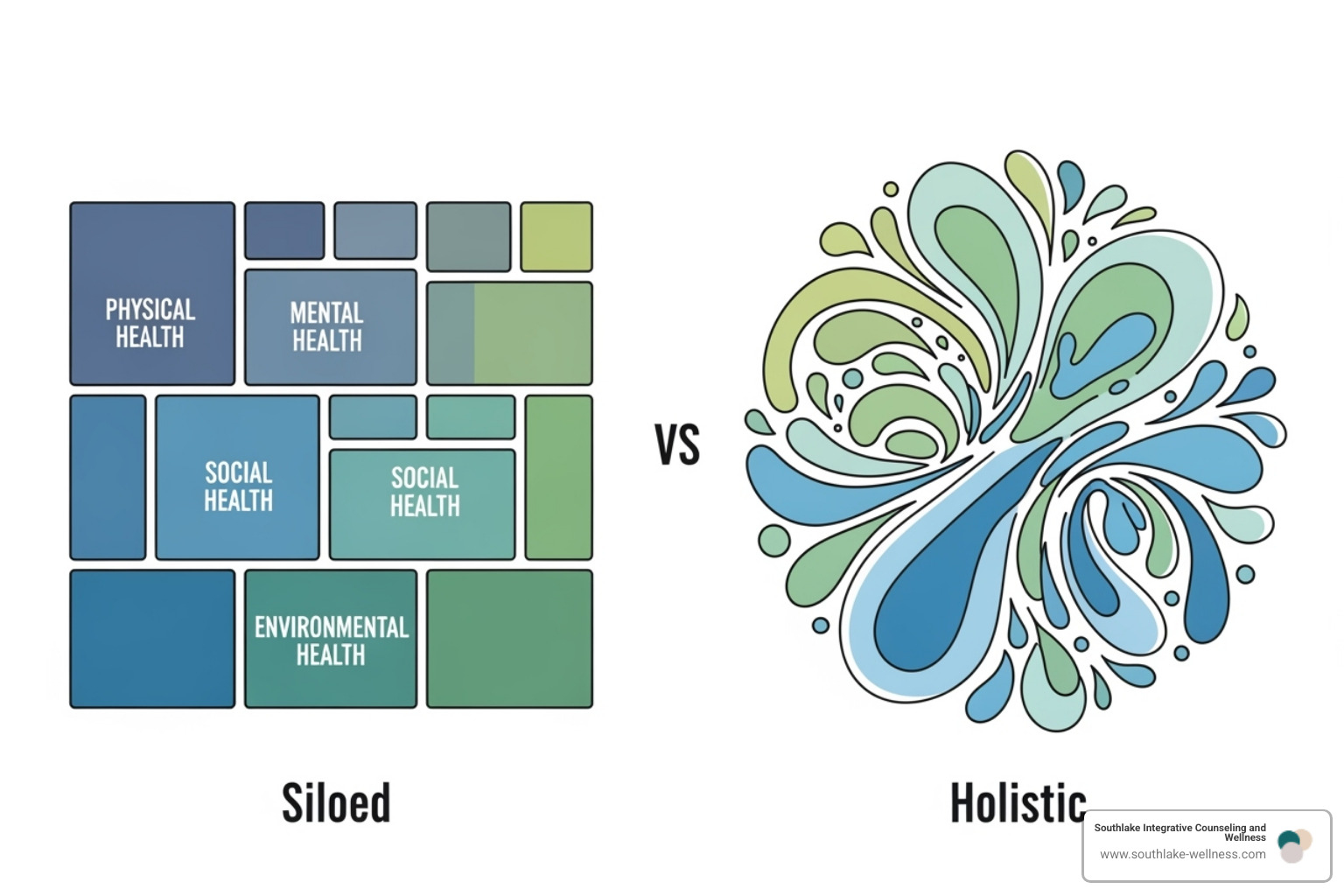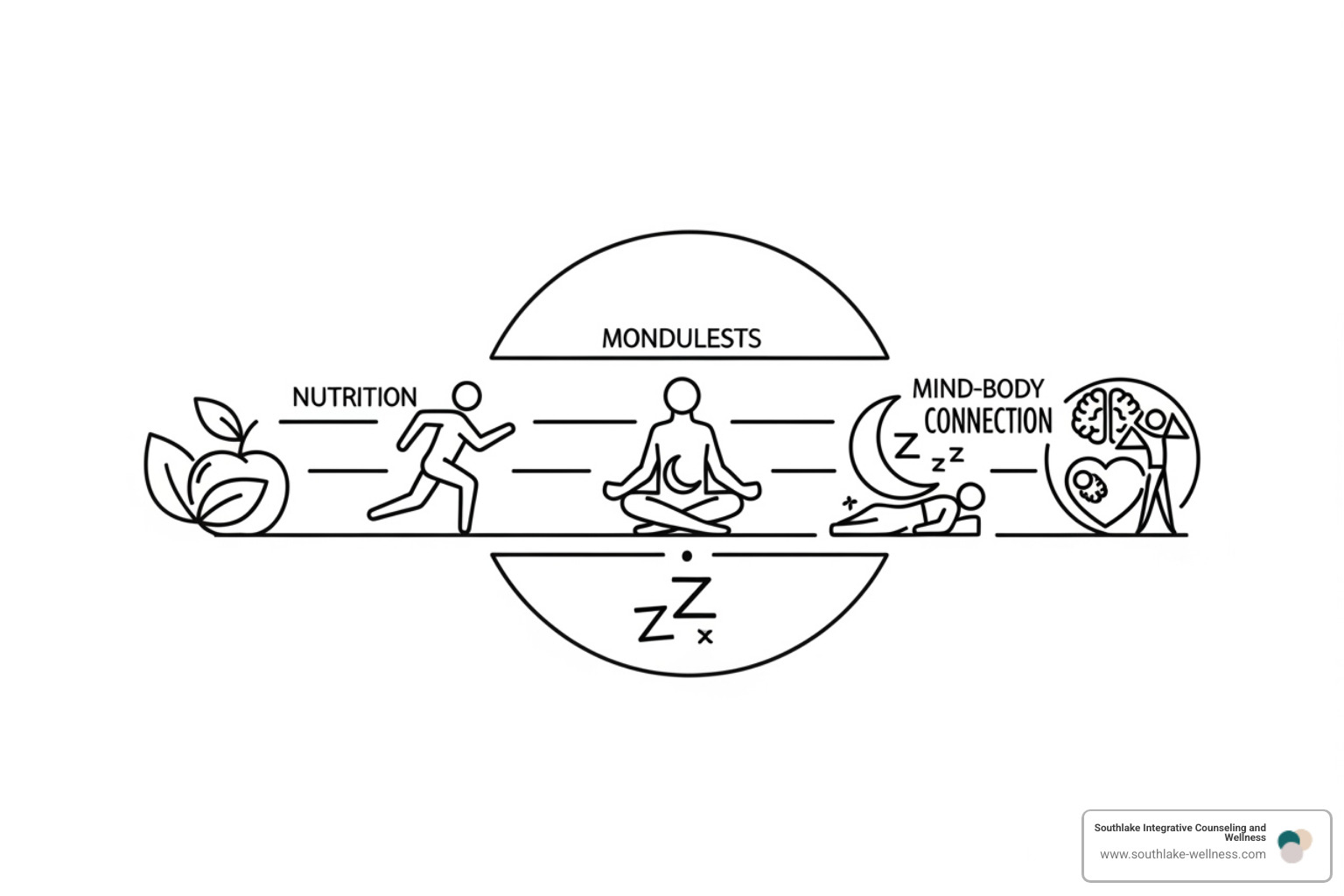
Moving Beyond Symptom Management
Holistic mental wellness is a transformative approach that views you as a complete person, not a collection of symptoms. It recognizes that your emotional, physical, spiritual, and social well-being are deeply interconnected.
Key components include:
- Mind-body-spirit integration: Addressing all dimensions of your health.
- Root cause focus: Identifying underlying factors, not just managing symptoms.
- Personalized approach: Recognizing that each wellness journey is unique.
- Proactive prevention: Building resilience before problems escalate.
Traditional methods often treat symptoms in isolation, potentially missing the bigger picture of what creates lasting wellness. In contrast, research shows that addressing multiple dimensions of health simultaneously—from nutrition and sleep to relationships and spiritual practices—creates a foundation for sustainable well-being.
The mind-body connection is particularly powerful. Stress and negative emotions trigger physiological changes, meaning that improving physical health can directly benefit mental wellness, and vice versa. At our practice, we focus on customizing therapeutic approaches that address the whole person, integrating evidence-based therapies with lifestyle factors to support comprehensive healing.

What is Holistic Mental Wellness and How Does It Work?
True well-being is more than the absence of sickness; it's feeling energized, emotionally balanced, and connected. That's holistic mental wellness in action. It recognizes that your mental health is woven together with your physical health, relationships, environment, and daily habits. When one area suffers, the others are affected.
Unlike traditional models that may treat symptoms in separate boxes, a holistic approach asks, "What's happening in your whole life that might be contributing to how you feel?" This shift from reactive symptom management to proactive, whole-person care is transformative. It empowers you to become an active participant in your healing, learning to recognize the connections between your thoughts, feelings, and physical sensations.
Research supports this comprehensive view, showing that addressing multiple health dimensions simultaneously creates more sustainable improvements. A study on holistic approaches highlights how this integrated perspective is crucial for long-term well-being.

The Core Dimensions of Your Well-being
Your well-being is an interconnected web. At Southlake Integrative Counseling and Wellness, we look at the complete picture of your life, which includes:
- Physical health: The foundation of well-being, encompassing sleep, nutrition, and movement.
- Mental and emotional health: How you think, process information, and manage feelings.
- Spiritual health: Your sense of purpose, meaning, and connection, which isn't necessarily religious.
- Social connections: The support system from family and community that helps you steer life.
- Financial wellness: Stability that reduces stress and frees up mental energy.
- Work environment: The physical and social dynamics that impact your daily well-being.
These dimensions fluctuate, and that's normal. The goal is to understand their interplay and nurture them accordingly.
The Practical Benefits of a Holistic Approach
Adopting holistic mental wellness means building a life that supports you from every angle. The benefits are far-reaching:
- Improved mood regulation: Addressing root causes, like linking diet to energy levels, leads to stable emotions.
- Increased resilience to stress: Developing a diverse toolkit of coping strategies, from breathing techniques to strong relationships.
- Better physical and cognitive health: The mind-body connection means that as stress decreases, physical health and mental clarity often improve.
- Deeper purpose and connections: Caring for yourself on multiple levels gives you more energy for meaningful activities and relationships.
- Personal empowerment: You learn to recognize early warning signs of imbalance and address them proactively.
For more specific strategies on managing stress holistically, explore our guide: More on holistic stress management
The 5 Cornerstones of Daily Holistic Practice
Five key areas make the biggest difference in daily holistic mental wellness. These are not overwhelming overhauls but simple, foundational practices that work together.

Think of these five cornerstones as the foundation of your wellness. They support each other in a positive cycle: good nutrition fuels movement, movement improves sleep, and good sleep improves mindfulness. Small, consistent changes in these areas can create big shifts in your overall well-being.
The key is daily integration. By making these gentle practices part of your everyday routine, they become habits of self-care. What makes these cornerstones so powerful is that they are actionable, offering concrete steps you can take today to build a more resilient, balanced life.
1. Nourishing Your Mind: The Power of Nutrition
The gut-brain-axis is the two-way communication highway between your digestive system and your brain. The field of nutritional psychiatry shows that what you eat profoundly impacts how you feel, think, and behave. Gut inflammation, for example, is directly linked to anxiety and depression.
You can positively influence this connection through your diet. Key nutritional elements include:
- Probiotics: Found in foods like yogurt, these beneficial bacteria can help regulate emotional behavior and reduce symptoms of anxiety and depression.
- Adaptogens and Supplements: Herbs like Ashwagandha can help the body manage stress, while supplements that boost GABA can help calm anxiety. Always check with a professional before starting new supplements.
- Healthy Fats and Antioxidants: Omega-3s are crucial for brain function, while antioxidant-rich foods like dark chocolate can help reduce stress.
- Hydration: Staying properly hydrated is essential for mental clarity and energy.
Making these changes doesn't have to be overwhelming. Start by gradually incorporating more fresh produce, lean proteins, and healthy fats while reducing processed foods. Small, consistent changes are key to your holistic mental wellness journey.
To learn more about personalized nutritional approaches, explore our approach to nutrition.
2. Moving Your Body: The Physical-Mental Link
Movement is one of the most accessible tools for holistic mental wellness. When you move your body, it releases endorphins, natural mood boosters that make you feel happier and more relaxed. Research shows that regular physical activity can be as effective as antidepressants for mild to moderate depression, and just five minutes of activity can significantly improve your mood.
Movement is also a powerful tool for stress reduction, helping to release physical tension held in the body. We recommend aiming for 30 minutes of moderate exercise, 3-5 times a week, but the key is finding what feels good to you. Joyful movement can include:
- Walking
- Yoga
- Dancing
- Stretching
- Cycling
- Swimming
Start where you are with small, manageable steps. At Southlake Integrative Counseling and Wellness, we help you find mindful movement that resonates with your unique needs, understanding that your relationship with your body is deeply personal.
For more insights on how physical therapy can improve your mind-body connection, visit: More on mind-body physical therapy
3. Cultivating Presence: Mindfulness and Meditation
In our always-on world, simply being present is a powerful tool for your holistic mental wellness toolkit. Mindfulness is the ability to be fully aware of the here and now without judgment. It's accessible, requires no special equipment, and can be practiced anytime.
Research consistently shows that mindfulness can significantly reduce stress, anxiety, and depression. Mindfulness as a strategy for stress By anchoring to the present, you create space between yourself and your worries, allowing you to observe thoughts without getting entangled.
Simple ways to practice mindfulness include:
- Breathing exercises: Focusing on slow, deep breaths can quickly calm your nervous system.
- Body scan meditation: Bringing awareness to different parts of your body to reconnect and release tension.
- Mindful walks: Engaging your senses during a walk to turn it into a mental reset.
- Self-awareness questions: Checking in with yourself by asking, "What am I feeling right now?"
Even a few minutes of daily practice can create meaningful change. It's not about perfection, but about showing up for yourself with curiosity and compassion.
4. Restoring Your System: The Critical Role of Sleep
Sleep is your body's nightly maintenance crew, essential for filing memories, repairing muscles, and recharging your immune system. It's a cornerstone of holistic mental wellness, affecting everything from mood to cognitive function.
Consistently getting 7-9 hours of quality sleep sharpens focus, stabilizes mood, and helps you handle stress. Poor sleep, on the other hand, can weaken your immune system, disrupt hormones, and negatively impact your mental state.
To improve your sleep, focus on these key areas:
- Consistent Routine: Go to bed and wake up around the same time each day to regulate your body's internal clock.
- Optimal Environment: Keep your bedroom dark, cool, and quiet to signal that it's time to rest.
- Limit Screen Time: The blue light from screens suppresses melatonin, the sleep hormone. Power down at least an hour before bed.
- Avoid Stimulants: Heavy meals, caffeine, and alcohol close to bedtime can disrupt sleep cycles.
Prioritizing rest is a direct investment in your overall well-being, setting you up for better emotional regulation, clearer thinking, and greater resilience.
5. Integrating It All: The Mind-Body Connection
The mind-body connection is the reality that your thoughts, emotions, and physical body are a unified system. What happens in your mind directly influences your body, and vice versa. For example, stress causes muscle tension, and physical pain can affect your mood.
This interconnection provides multiple entry points for healing. Addressing physical tension can ease emotional stress, and working through emotions can relieve physical symptoms. This is central to your holistic mental wellness journey.
Somatic experiencing is one way to tap into this connection, recognizing that the body holds stress and trauma. By listening to physical sensations, you can access deeper healing.
Understanding the mind-body connection expands your wellness toolkit. Practices like deep breathing, meditation, visualization, and progressive muscle relaxation engage both your mental focus and your body's relaxation response. This integrated approach means you are honoring both your mental and physical health as part of the same conversation.
For more insights on how mind-body approaches can support your wellness journey, explore: More on mind-body wellness
The Role of Therapy in Your Holistic Mental Wellness Journey
While the five cornerstones are a powerful foundation, professional support can help steer deeper challenges. Therapy provides a skilled guide for your holistic mental wellness journey, offering a safe, non-judgmental space to explore emotions, heal past hurts, and develop robust coping strategies.

At Southlake Integrative Counseling and Wellness, we see therapy as one piece of your wellness puzzle. We combine evidence-based therapies with alternative approaches that honor the mind-body connection, addressing your whole system—not just your thoughts. Learn more in Our integrative therapy guide.
Finding the Right Therapeutic Fit
There is no one-size-fits-all approach to therapy. We create individualized treatment plans based on your unique needs. Some of our approaches include:
- Holistic Psychotherapy: Integrates various techniques to address your emotional, psychological, and spiritual well-being.
- Registered Body Psychotherapy: Uses body awareness to access and release stored emotional experiences.
- Cognitive Behavioral Therapy (CBT): An effective tool for identifying and changing negative thought patterns.
- Somatic Experiencing (SE): A gentle approach to release stored trauma and help the nervous system rebalance.
- Neurofeedback and QEEG: Advanced techniques to train brainwave patterns for better regulation.
- Play Therapy and Art Therapy: Creative modalities for younger clients to express and process emotions.
You can learn more about all our therapeutic options here: Our services
How Lifestyle and Environment Impact Your Holistic Mental Wellness
Your well-being is shaped by your daily life. Understanding these connections is crucial for lasting holistic mental wellness.
- Work-life balance: Setting boundaries to prevent burnout is essential.
- Social connections: Meaningful relationships improve heart health and reduce loneliness.
- Physical environment: Access to green spaces and a calm, safe home can lower stress and improve mood.
- Digital wellness: Managing screen time reduces digital stress and protects your mental space.
Addressing these external factors alongside internal healing work creates the conditions for sustainable well-being.
Frequently Asked Questions about Holistic Wellness
Here are answers to some common questions about this approach to well-being.
How is holistic wellness different from just living a healthy lifestyle?
While a healthy lifestyle focuses on individual habits like diet and exercise, holistic mental wellness goes deeper. The key differences are:
- Interconnection: It recognizes that your mind, body, and spirit are constantly interacting. Stress at work can affect your sleep; gut health can impact your mood.
- Root Causes: It seeks to understand underlying factors (emotional patterns, nutritional deficiencies) rather than just treating surface-level symptoms.
- Personalization: It's a deeply personalized approach custom to your unique life circumstances, history, and goals.
Can a holistic approach help with diagnosed conditions like anxiety or depression?
Yes. Holistic mental wellness provides a comprehensive framework that complements traditional treatments for conditions like anxiety and depression. Mental health challenges often involve a complex mix of factors, including brain chemistry, inflammation, stress, and nutrition. A holistic approach addresses this whole picture.
We add more tools to your wellness toolkit by combining talk therapy with nutritional support, movement practices, and stress management techniques. Addressing these underlying factors can significantly impact symptoms and create multiple pathways to feeling better. Learn more in Our holistic approach to depression.
How long does it take to see results?
Holistic mental wellness is a journey, not a quick fix. Some benefits, like a mood boost from exercise, can be immediate. However, deeper, lasting changes—like healing old wounds or shifting long-standing patterns—take patience and consistency. Everyone's journey is different.
The goal is progress over perfection. Each small step builds momentum toward lasting well-being. It's not about "fixing" yourself quickly, but about building a foundation for thriving that will serve you for years to come.
Conclusion: Accept Your Journey to a Balanced Life
Your journey toward holistic mental wellness is about finding who you are when all parts of your life work in harmony. It's a celebration of your whole self—a complete person with interconnected physical, emotional, spiritual, and social dimensions. Honoring these layers together builds resilience, stabilizes mood, and deepens relationships.
The five cornerstones—nutrition, movement, mindfulness, sleep, and the mind-body connection—are your daily toolkit for an authentic, sustainable life. The power of this integrated approach is that every positive step creates momentum. Addressing gut health supports your mood; moving your body calms your mind.
Taking the first step can feel overwhelming, which is why professional guidance is so valuable. You don't have to do this alone. Empowerment through self-care means making choices that honor your whole self and creating daily practices that nurture your mind, body, and spirit.
At Southlake Integrative Counseling and Wellness, we believe your healing journey is unique. We're here to offer professional expertise and a supportive environment to help you thrive. Your path is about progress, self-compassion, and the courage to grow.
Ready to take the first step? Begin your holistic wellness journey with individual therapy in Southlake, TX. Your balanced, fulfilling life is waiting.